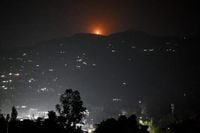Tensions between India and Pakistan have escalated dramatically following a series of missile strikes launched by India on May 6, 2025. The attacks targeted multiple locations in Pakistan and Pakistan-controlled Kashmir, including Bahawalpur, Muzaffarabad, and Kotli. According to reports from the Pakistani military, at least seven people were killed, including two children, and fourteen others were injured in the strikes. The Pakistani military condemned the attacks, emphasizing that one missile struck a mosque, labeling the incident as a "blatant violation of international law." Ahmed Sharif, a spokesperson for the Pakistani military, characterized the Indian actions as severe provocations.
In response to the missile strikes, Pakistan claimed to have shot down five Indian Air Force aircraft, including three Rafale jets, one Su-30, and one MiG-29, asserting that all aircraft were downed within Indian airspace. This incident has heightened the already tense situation between the two nuclear-armed neighbors, with both sides exchanging accusations of civilian casualties and violations along the Line of Control.
The backdrop to this escalation can be traced back to an attack on April 22, 2025, in Pahalgam, Kashmir, where 26 people were killed, including Indian tourists. This attack was attributed to Pakistan-backed militant groups, which India has claimed are responsible for ongoing violence in the region. Following the Pahalgam attack, Indian Prime Minister Narendra Modi vowed to "hunt down the culprits to the ends of the earth," leading to increased military rhetoric and actions.
On May 6, India initiated what it called Operation Sindoor, targeting nine terror camps in Pakistan-occupied Kashmir. The Indian Ministry of Defence stated that the operation was focused, controlled, and non-escalatory, emphasizing that it did not target any Pakistani military installations. However, Pakistan's Defence Minister Khawaja Asif refuted this claim, stating that the strikes were directed at civilian areas and not militant bases.
In the wake of the attacks, Pakistan closed its national airspace for 48 hours and canceled all flights, while several airports in northern India were also shut down until further notice. Major airlines, including EVA Air and China Airlines, were forced to adjust their flight paths, with some flights returning to their origin points or diverting to alternative airports due to the conflict.
As the situation developed, the United States expressed concern over the escalating conflict. U.S. Secretary of State Marco Rubio spoke with both Indian and Pakistani officials, urging restraint and emphasizing the importance of cooperation in addressing terrorism. The U.S. has historically supported India in its fight against terrorism while also encouraging Pakistan to take action against militant groups operating within its borders.
China, on the other hand, has positioned itself as a supporter of Pakistan, with Foreign Minister Wang Yi stating that the conflict does not serve the interests of either nation and urging both sides to exercise restraint. The relationship between China and Pakistan has been solidified through various military and economic partnerships, which further complicates the regional dynamics.
India's actions have not only drawn international scrutiny but have also led to significant domestic political pressure. Following the Pahalgam attack, Modi's government faced calls from within the ruling Bharatiya Janata Party (BJP) to take military action against Pakistan. The termination of the Indus Water Treaty, which governs water sharing between the two countries, has also been seen as a strategic move by India to exert pressure on Pakistan, as the treaty is crucial for Pakistan's agricultural sector.
Despite the rising tensions, analysts suggest that a full-scale war is unlikely due to the nuclear capabilities of both nations. The potential for catastrophic consequences in the event of a nuclear conflict serves as a deterrent for both sides, although the risk of miscalculation remains high.
The situation is reminiscent of previous conflicts between India and Pakistan, particularly the air skirmishes following the Pulwama attack in 2019, which resulted in significant military engagements. As both nations continue to exchange fire and accusations, the international community watches closely, hoping for a diplomatic resolution to the escalating crisis.
In summary, the conflict between India and Pakistan has reached a critical juncture, with military actions leading to civilian casualties and heightened geopolitical tensions. The international community's involvement and the historical context of the Kashmir dispute add layers of complexity to an already volatile situation. As both nations navigate this precarious landscape, the potential for further escalation remains, underscoring the urgent need for dialogue and de-escalation.





